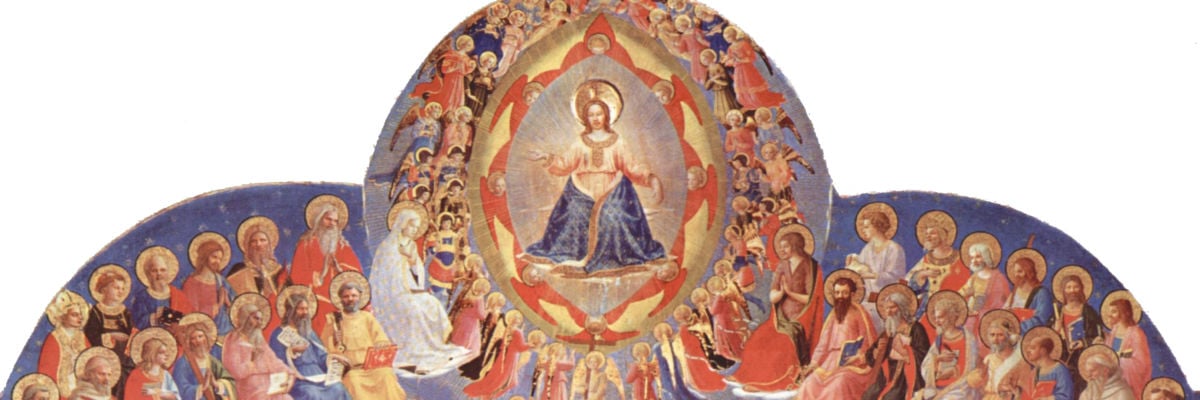
Homily for the Solemnity of Christ the King, Year A
Jesus said to his disciples:
“When the Son of Man comes in his glory,
and all the angels with him,
he will sit upon his glorious throne,
and all the nations will be assembled before him.
And he will separate them one from another,
as a shepherd separates the sheep from the goats.
He will place the sheep on his right and the goats on his left.
Then the king will say to those on his right,
‘Come, you who are blessed by my Father.
Inherit the kingdom prepared for you from the foundation of the world.
For I was hungry and you gave me food,
I was thirsty and you gave me drink,
a stranger and you welcomed me,
naked and you clothed me,
ill and you cared for me,
in prison and you visited me.’
Then the righteous will answer him and say,
‘Lord, when did we see you hungry and feed you,
or thirsty and give you drink?
When did we see you a stranger and welcome you,
or naked and clothe you?
When did we see you ill or in prison, and visit you?’
And the king will say to them in reply,
‘Amen, I say to you, whatever you did
for one of the least brothers of mine, you did for me.’
Then he will say to those on his left,
‘Depart from me, you accursed,
into the eternal fire prepared for the devil and his angels.
For I was hungry and you gave me no food,
I was thirsty and you gave me no drink,
a stranger and you gave me no welcome,
naked and you gave me no clothing,
ill and in prison, and you did not care for me.’
Then they will answer and say,
‘Lord, when did we see you hungry or thirsty
or a stranger or naked or ill or in prison,
and not minister to your needs?’
He will answer them, ‘Amen, I say to you,
what you did not do for one of these least ones,
you did not do for me.’
And these will go off to eternal punishment,
but the righteous to eternal life.”-Matthew 25:31-46
Why does Christ our great King and Judge call those on his right “you who are blessed by my Father” but those on his left “accursed”—not “accursed by my Father”?
As usual, there is a great answer from the traditional Doctors and Church writers, but let’s wait for their answer and consider a few helpful things first.
Have you ever played “airplane” with a baby who was reluctant to eat? If you were lucky, your antics delighted the bambino, and into the hangar went the plane, loaded with applesauce. But we all know how resolute a baby can be in refusing, with lips firmly closed and head turning from side to side. Even though the mouthful is something he usually likes, no amount of signaling can get the plane to land and park.
The baby is gradually discovering something, namely, that even though he has many needs for things he likes and for which he must cry out and on which he is utterly dependent, he is also able to be autonomous; he is able to say “no” even to things he ordinarily likes.
Thus the child learns a new delight—not something to see, or hear, or touch, or smell, or taste, or imagine, but just one thing: the satisfaction of having one’s own will. Now this is fine and good if what he wills is something good for him. But as he grows older the possibility develops of just loving his own will because it is his own will. This is almost, if not entirely, the definition of sin.
The fact is that if we really understand sin and virtue, we will see that every material aspect of a sin is not something bad or evil; all the aspects of the things we want to do or say or think about or use are just good, created qualities. When we misuse those good things slightly or seriously, we sin. The misuse is not due to their nature, but to our own self-will. Beautiful bodies, sums of wealth, effective words, possessions, associations, skills, and talents are all good in themselves. It is our willed misuse of them that constitutes sin.
This is necessarily true because everything is created by God, and God did not create anything evil. Even our will is so good that we cannot choose evil unless we pretend to ourselves that it is really good. Evil is not a thing; it is rather something missing, a lack of good, a disorder.
This has everything to do with how Christ our Lord and Creator judges and rewards our actions. He rewards those who are about to enter heaven for using the good things that God has given them so as to fulfill his commandments; that is, to do his will. Their actions showed that they prayed sincerely, “Thy kingdom come, thy will be done on earth as it is in heaven,” and now they are finally going there! They were positively blessed by the Father because they are going to that happiness that was prepared for all human goodness by the creator of human goodness.
They sinned, yes, but their love, especially their works of mercy (yes, that’s what Our Lord says!) made them blessed by the Father, since these very works and their reward were prepared for them by him. God is the Creator of all things, but most of all of loving persons and their actions. “Love covers a multitude of sins,” the apostle tells us.
In the case of those who are sent away to the fires of hell, yes, they are accursed, but not “by my Father.” St. Thomas, explicitly following Origen on this point, tells us that the blessed are blessed by God, but those who are cursed have their own curse that does not come from him. Their curse cannot ultimately be the work of God. He can bless after a curse, but he does not curse definitively because his curse is ultimately not on any of his creatures, but only on sin.
Thomas, following St. Gregory, says that God takes no delight or complacency in the condemnation of the wicked; rather he loves his goodness and therefore cannot love, cannot reward, the evil in which they persist. Hell, Gregory tells us, is not for any good nature, angelic or human, but is prepared simply for sin. Heaven, on the other hand, is God and all he has created come to the fullest perfection. Compared to this, hell is a shadow as close to nothing as nothing can be.
“And of his fullness we have all received,” St. John tells us. This can give us some insight into the mercy of God. He really does not hate the sinner (that means you and me!), but only the sin. Hell is the condemnation of a sinful will, and only accidentally the eternal condemnation of those who will not rid themselves of it. Christ our King knows that everything you have, and especially the will that you can use to love or offend him, is good and comes from him. He loves your will even more than you do. Just as the baby’s mother loves his potential health and happiness more than he does, even though she knows he can resist her love.
So let’s not be stubborn, loving our own will against our own true good, but repent and begin to love as our King enthroned in judgment has taught us, and then some great day we will hear him say, “Come, blessed of my Father…”



